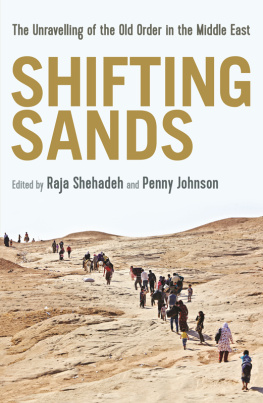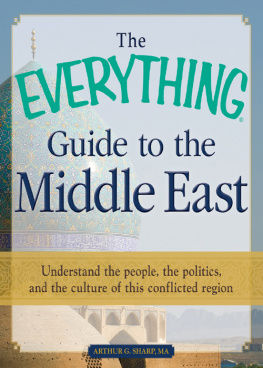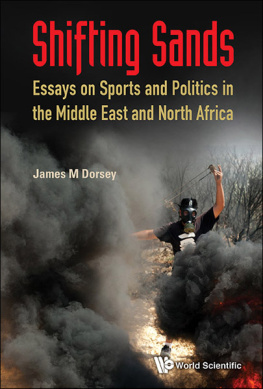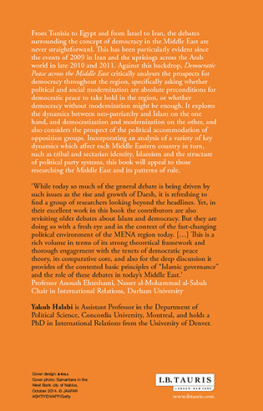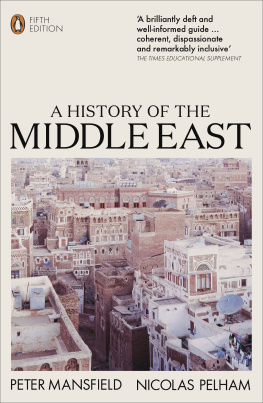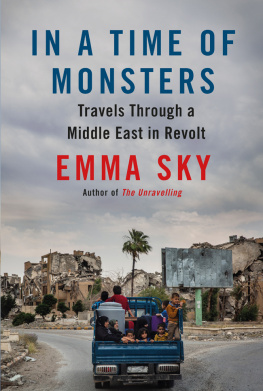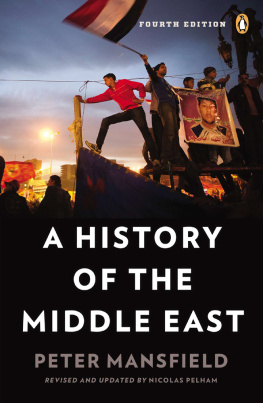SHIFTING SANDS
The Unravelling of the Old Order in the Middle East
SHIFTING SANDS
Edited by Raja Shehadeh and Penny Johnson

First published in Great Britain in 2015 by
PROFILE BOOKS LTD
3 Holford Yard
Bevin Way
London
WC1X 9HD
www.profilebooks.com
In association with the Edinburgh International Book Festival

The Significance of a Screwdriver Penny Johnson, 2015; The Post-Ottoman Syndrome Avi Shlaim, 2015; The Divisive Line: The Birth and Long Life of the SykesPicot Agreement James Barr, 2015; Why Did You Rename Your Son? Diaries of the Great War from the Ottoman Front Salim Tamari, 2015; Opening Politics Black Box: Reflections on the Past, Present and Future of the Egyptian Revolution Khaled Fahmy, 2015; Cracked Cauldrons: The Failure of States and the Rise of New Narratives in the Middle East Tamim al-Barghouti, 2015; A Long View from Baghdad Justin Marozzi, 2015; Iran: Coming in from the Cold? Ramita Navai, 2015; Civic Courage: The Clue to Turkeys Future? Alev Scott, 2015; Living and Writing in Kuwait: What Fiction Can Do Mai al-Nakib, 2015; Writing the Middle East, Writing Gaza Selma Dabbagh, 2015; Fictions Histories: Writers and Readers in the Middle East Marilyn Booth, 2015; What You Dont Read About the Syrian Humanitarian Crisis Dawn Chatty, 2015; Syria Seen and Represented Robin Yassin-Kassab, 2015; Defying the Killers: The Emergence of Street Culture in Syria Malu Halasa, 2015; Palestine and Hope Raja Shehadeh, 2015
Selection copyright Penny Johnson and Raja Shehadeh, 2015
The moral right of the authors has been asserted.
All rights reserved. Without limiting the rights under copyright reserved above, no part of this publication may be reproduced, stored or introduced into a retrieval system, or transmitted, in any form or by any means (electronic, mechanical, photocopying, recording or otherwise), without the prior written permission of both the copyright owner and the publisher of this book.
A CIP catalogue record for this book is available from the British Library.
eISBN 978 1 78283 192 1
THE SIGNIFICANCE OF A SCREWDRIVER
Penny Johnson
To Raed Taysir al Hom, who defused bombs with a screwdriver until his luck ran out
RAED AL HOM, the head of northern Gazas only bomb disposal unit, died on 13 August 2014, the third day of a temporary ceasefire in Israels war on Gaza and the second day of the five panels on the Middle East at the Edinburgh International Book Festival which inspired this book. Raed, a resident of Gazas Jabaliya refugee camp, was already a hero to Palestinians. With no protective clothing and little equipment, he had successfully defused 400 unexploded objects: ordnance dropped by the Israeli air force and army that hit homes, Gazas crowded streets and, in one case, a bicycle repair shop. Arriving in Edinburgh from our home in Palestine and still shaken by the events taking place there, Raja and I were hit particularly hard by his death, which came while he was trying to defuse a 500-kilogram explosive. Defusing bombs with screwdrivers this image haunted us as panellists travelled through a century of crisis and wars, colonial powers, new borders and fragile states, great cities and unending conquest, authoritarian power and peoples civic resistance.
As the rain beat on the book festival tent, sometimes softly and sometimes with bullet-like intensity, reminding many of us of moments at home, fifteen writers historians, novelists, social and cultural critics, travel and memoir writers addressed large and enthusiastic audiences. Their presentations, like the essays in this book, were thoughtful, deeply informed and replete with observations that illuminate the present, past and future of the region. But they were not cold and dispassionate: the Middle East for some is home and family, for others a lost homeland or a beloved landscape of memory, but for all a place of friends and colleagues and the subject of a writers insistent quest to understand. Thus noted historian Khaled Fahmy from Cairo began by reading the just-released Human Rights Watch Report on the Egyptian armys mass killing of protesters at Rabaa square in Cairo, on the anniversary of that event, and went on to probe a peasants revolt in the nineteenth century to try to understand the deeper dynamics of Egypt and the Arab world today. Alev Scott held up a T-shirt she wore in the Gezi Park protests in Turkey in the summer of 2013, while offering a sober and sobering assessment of its aftermath. Tamim al-Barghouti provided a broad and innovative framework for understanding the dynamics of contemporary popular revolt against authoritarian Arab states and also read part of his powerful poem that resonates with the Gaza War.
There are many ways the Middle East is defined and named: several United Nations organisations suggest the geographically correct but historically and politically weak Western Asia, while the World Bank and other international institutions prefer to talk of MENA, the Middle East and North Africa. Arabists and indeed many Arabs speak of the Arab world, dropping off Turkey, Iran and the non-Arab populations residing in Arab countries. Then there are those who simply speak of the region, perhaps the vaguest term but one that signals a place and people that are interconnected. While one would perhaps prefer the rich culinary connections as a guide to the region, today one defines the region by serial crises and insecurity. A region on fire in far too many ways.
A pen is less useful than a screwdriver; a writers task is certainly less pragmatic and exponentially less dangerous than bomb defusing, and Raed al Homs life and death are no metaphor. Yet the urgency of understanding the wave of events that terrible summer and onwards indeed, the aftermath of the Arab Spring from the war in Gaza to the advance of the Islamic State to the floods of Syrian and other refugees brought writers together in Edinburgh armed only with a pen and a voice to probe the unravelling of the old order in the Middle East and its consequences.
That mission took us back a hundred years to the outbreak of the First World War.

One might think that urgent contemporary crises overwhelm historical events when it comes to reflecting on and writing about the Middle East. But, as our contributors show so eloquently, the events of a century ago are not simply background to todays conflagrations, but producers of the same. Consider an event that for many seemed to come out of the blue that summer: on 10 June, the Islamic State of Iraq and the Levant (ISIL, or Daesh in Arabic, or simply IS, the Islamic State) took over Mosul as the Iraqi army literally evaporated, a military defeat called by veteran journalist Patrick Cockburn one of great military debacles in history. Unlike the measured on-the-ground analyses of Cock-burn and some fellow journalists, politicians and pundits outside the region rushed in with little information but many generalisations about the Islamic State and its trajectory. What can a long view tell us?
In his essay, James Barr takes us back to 1915, as two men, Mark Sykes, a 36-year-old English Tory politician, and Franois Georges-Picot, a French diplomat, sit down over a map and draw a line in the sand, from the e of Acre [Palestine] to the last k in Kirkuk [Iraq], dividing much of the region particularly the Arab lands of the dying Ottoman Empire into French and British spheres of influence, later regularised as Mandates. The ensuing 1916 secret agreement, as Barr argues convincingly (and with telling anecdotes), signalled an immense change in the political geography of the Middle East. Thus today, while erasing the border between Syria and Iraq through military conquest, the Islamic State declared the end of the SykesPicot Agreement and a new caliphate in June 2014. Surely, as William Faulkner told us, The past is never dead. Its not even past. We would argue, however, that the militants of ISIL are poor historians, seemingly intent on erasing not just the last hundred years, but thirteen centuries of Islamic and Middle Eastern civilisation. As Justin Marozzi reminds us in his own long view from Baghdad, For the first time in 2,000 years the ancient city of Mosul has no Christians. Both in ISILs erasure of the past and its utilisation of an Islamic essence that defies history, we can recall the Khmer Rouge, in an apt comparison by political analyst Mouin Rabbani, who also argues convincingly that ISIL is a thoroughly modernist project. Its savvy and cruel use of media also attests that it is a creature of our troubled twenty-first century.
Next page
